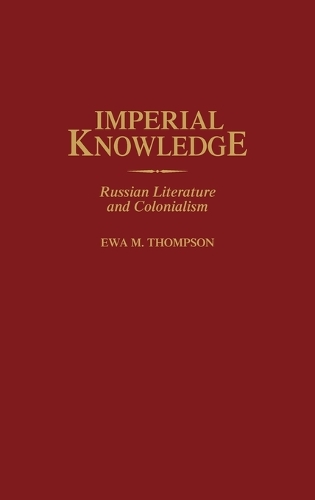
Imperial Knowledge: Russian Literature and Colonialism
(Hardback)
Publishing Details
Imperial Knowledge: Russian Literature and Colonialism
By (Author) Ewa M. Thompson
Bloomsbury Publishing PLC
Praeger Publishers Inc
30th March 2000
United States
Classifications
Tertiary Education
Non Fiction
Colonialism and imperialism
National liberation and independence
891.7009
Physical Properties
Hardback
248
Width 156mm, Height 235mm
510g
Description
Readers have long recognized that Western literature reflects the social, political, and cultural structures that favored colonial masters and their point of view. In both popular and scholarly usage, colonies are territories whose conquest requires travel overseas. Because Russia's contiguous colonies have generally been viewed as gradual and legitimate enlargements of Russian territory and ethnicity, Russian literature has escaped the scrutiny given to Western literary works. This volume argues that Russia's acts of territorial expansion are a form of colonization, and it employs postcolonial theory to explore Russian literature and the power structures reflected in it. The volume initially overviews issues of nationalism and imperialism and the failure of literary critics to treat Russia as a colonial power. It then places Russian literature within the context of postcolonial theory and discourse. It examines the rhetorical techniques that enabled Pushkin and Lermontov to create a repertoire of colonialist perceptions and stereotypes; it argues that Tolstoy's War and Peace provided Russian culture with its first and arguably most magnificent expression of national self-confidence; and it analyzes the imperial habits of Russian culture manifested in the novels and stories of Anatolii Rybakov and Valentin Rasputin. The book additionally looks at Solzhenitsyn's Cancer Ward; various works of nonfiction, including history textbooks; and the efforts of recent writers to undermine Russian imperialism.
Reviews
"A pioneering book--vigorous, provocative, broadly informed and crisply written. Not to be ignored by anyone concerned with Russian culture."-Donald Fanger Harry Levin Research Professor of Literature Harvard University
"An erudite and magisterial study."-Richard F. Staar Senior Fellow The Hoover Institution Stanford University
"In this thought-provoking, well-written, and fairminded book, Ewa Thompson addresses the complicity of Russian literature and even literary scholarship in furthering the goals of Russian colonialism and imperialism. A fresh perspective on the culture of Russian literature from the time of Pushkin to the post-Soviet period, Imperial Knowledge is a timely challenge to the usual ways Russian literature is read and taught."-Harold B. Segel Professor Emeritus of Slavic and Comparative Literature Columbia University
.,."a masterful analysis regarding the role played by literati in tsarist, Soviet, and post-communist Russia. One cannot but be amazed by the timespan in this book, which even analyzes tests currently being used in the school system....this exceptionaly well researched, thoroughly documented, and gracefully written masterpiece."-Modern Age
...a masterful analysis regarding the role played by literati in tsarist, Soviet, and post-communist Russia. One cannot but be amazed by the timespan in this book, which even analyzes tests currently being used in the school system....this exceptionaly well researched, thoroughly documented, and gracefully written masterpiece.-Modern Age
[M]arks a considerable advance in our knowledge....The detailed and numerous annotations, the bibliography and the index will without doubt generate further study of the many issues raised in this fine book.-Slavic and East European Journal
Imperial Knowledge pursues several ends, all important and sharply defined.-World Literature Today
"Marks a considerable advance in our knowledge....The detailed and numerous annotations, the bibliography and the index will without doubt generate further study of the many issues raised in this fine book."-Slavic and East European Journal
"[M]arks a considerable advance in our knowledge....The detailed and numerous annotations, the bibliography and the index will without doubt generate further study of the many issues raised in this fine book."-Slavic and East European Journal
"Imperial Knowledge pursues several ends, all important and sharply defined."-World Literature Today
..."a masterful analysis regarding the role played by literati in tsarist, Soviet, and post-communist Russia. One cannot but be amazed by the timespan in this book, which even analyzes tests currently being used in the school system....this exceptionaly well researched, thoroughly documented, and gracefully written masterpiece."-Modern Age
Author Bio
EWA M. THOMPSON is Professor of Slavic Studies at Rice University. She is the author of several books, and her articles have appeared in such journals as Modern Age and Slavic Review.
